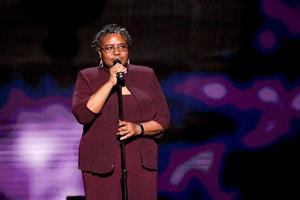
Silly question: Might America's Got Talent, or AGT to the converted, be the single most important program on television right now?
For the past couple of summers — since the summer of '16, anyway — AGT has been a balm, a ray of joy and hope in an otherwise darkened media landscape, a striking contrast to the ugliness and bereavement that permeates so much of the news today.
AGT used to be a silly diversion, a way for NBC — and summer viewers — to mark time before the serious business of the fall TV season. Boy, how that has changed.
 There were moments during last week's fourth final "Judges' Cuts" show when the charm and delight practically flew off the screen. The joke acts are a distant memory. I can't remember the last time AGT traded in ridicule or humiliation. Even the Karaoke Sauron — Simon Cowell (right) to you — has seemingly tempered his churlishness and gift for cruelty. He looks happy!
There were moments during last week's fourth final "Judges' Cuts" show when the charm and delight practically flew off the screen. The joke acts are a distant memory. I can't remember the last time AGT traded in ridicule or humiliation. Even the Karaoke Sauron — Simon Cowell (right) to you — has seemingly tempered his churlishness and gift for cruelty. He looks happy!
And so, by all accounts, are the viewers that have helped boost AGT to the top of the summer ratings — so much so that there has been talk of moving it to the real season when The Voice goes head-to-head against some of the toughest competition on conventional broadcast television
The live shows begin Tuesday (8 p.m. ET), and once again this seems to be a year for young performers. Children, even.
Please don't think for a moment, though, that means AGT has, in any way, become condescending or pandering. Ever since Pittsburgh, PA classical crossover singer and Sony Masterworks artist Jackie Evancho — now 19 — earned a 2nd place finish in AGT's 2010 season, at the age of 10, the most-watched summer TV talent competition has become serious business. The kids aren't just alright — they're exceedingly talented in some cases. Talented enough not just to make it as child acts, but talented enough to forge real careers in the big leagues once they grow up and legally come of age.
Jacqueline Marie "Jackie" Evancho has racked up 2.4 million in album sales in the U.S. alone since her head-turning appearance in AGT's fifth season.
 Grace VanderWaal, a singer and acoustic guitarist was just 12 (right) when she won AGT's 11th season in 2016, performed a heart-stopping rendition of her single Clearly on Stephen Colbert's late-night program last April; she’s now 15 and looking more like a young Taylor Swift than the awkward pre-teen who first strummed her ukulele all those years ago on AGT. (Her Colbert video of Clearly recently cleared 850,000 views on YouTube.) With an ear for possible irony, she titled her debut album Just the Beginning. "I'm going to predict," the Karaoke Sauron (Simon Cowell) said during a 2016 performance show, "we're all going to remember the moment, in the years to come, when we saw Grace sing live for the first time."
Grace VanderWaal, a singer and acoustic guitarist was just 12 (right) when she won AGT's 11th season in 2016, performed a heart-stopping rendition of her single Clearly on Stephen Colbert's late-night program last April; she’s now 15 and looking more like a young Taylor Swift than the awkward pre-teen who first strummed her ukulele all those years ago on AGT. (Her Colbert video of Clearly recently cleared 850,000 views on YouTube.) With an ear for possible irony, she titled her debut album Just the Beginning. "I'm going to predict," the Karaoke Sauron (Simon Cowell) said during a 2016 performance show, "we're all going to remember the moment, in the years to come, when we saw Grace sing live for the first time."
Ventriloquist Terry Fator, winner of AGT's second season, is today worth an estimated $140 million. The hip-hop dance crew Jabbawockeez, who made it to the Las Vegas callbacks that same season (but didn't make the final group of performers, interestingly) are collectively worth an estimated $25 million today.
Magician and Season 9 winner Mat Franco performs nightly today at Las Vegas’ LINQ Hotel and Casino, a gig he's held since 2015.
And then there's ventriloquist-singer Darci Lynne Farmer, who won AGT's 12th season in 2017 at the age of 10 and is today worth an estimated $3 million, following a national tour and a Christmas special for NBC.
It wouldn't be a season of AGT without controversy, of course. The difference is that AGT's controversies revolve around things like the audience vote and the inevitability that viewers watching at home and the show's judges are unlikely always to agree, and not controversies over psychological manipulation on the part of the producers — hello, Love Island! — or who did what to whom.
Some viewers last week were annoyed, for example — judging from reaction on social media — that guest judge Jay Leno vaulted 10-year-old opera singer Emanne Beasha (top) through to the live shows with his Golden Buzzer, seemingly at the expense of preternaturally talented 14-year-old Renton, WA singer-songwriter Benicio Bryant, who plays a soulful guitar into the bargain. They needn't have bothered — Bryant sailed through the judges' picks smoothly, despite the show's leaving the Bryant decision to the very end of last week's show, this after some faux-drama involving the Karaoke Sauron stopping the show in the middle of deliberations and demanding an unscripted meeting behind the scenes. ("'Unscripted' my ass," one angry commenter posted on YouTube.)
And then there was 13-year-old soul-and-blues singer Charlotte Summers, from Spain — also through to the live shows, on the very same performance show that pitted 10-year-old Beasha and 14-year-old Bryant against older, vastly more experienced contestants.
 It wouldn't be fair to mention AGT this season without also mentioning that a kind of ageism may be at work: By far the most agita on social media was reserved for the fact that the judges passed over Lexington, Kentucky gospel singer Callie Day (left) so that some of the younger performers might get through to the live shows. "I will tell you, honestly, you were a vote of contention," Howie Mandel told a visibly shaken Day. "We argued, and we ended with the decision that this is the end of the journey for you here. I am so sorry, Callie."
It wouldn't be fair to mention AGT this season without also mentioning that a kind of ageism may be at work: By far the most agita on social media was reserved for the fact that the judges passed over Lexington, Kentucky gospel singer Callie Day (left) so that some of the younger performers might get through to the live shows. "I will tell you, honestly, you were a vote of contention," Howie Mandel told a visibly shaken Day. "We argued, and we ended with the decision that this is the end of the journey for you here. I am so sorry, Callie."
Day admitted later that she found the decision"very disappointing" but vowed that she was going to "sing through it all...through the good days and bad days."
Inadvertently, she may have hit on the reason America's Got Talent is such a welcome breath of fresh air in these troubled times.
When a 10-year-old Emanne Beasha takes the stage and hits the high notes on Caruso — sharp, and dead-on, despite barely being able to speak in her real voice — it's hard to stay jaded.